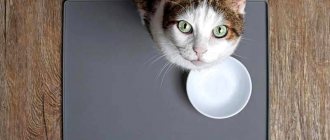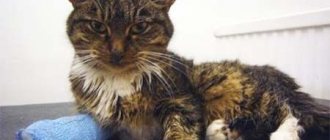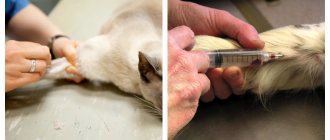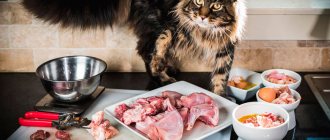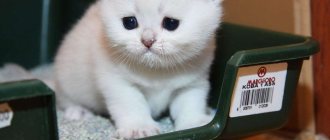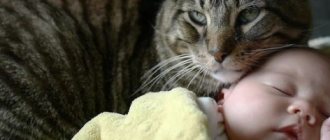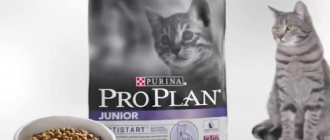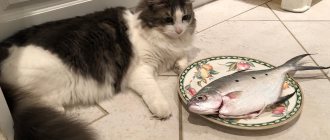Feeding a cat is not a difficult task.
Your pet doesn’t need culinary masterpieces: just make sure you have the correct ratio of proteins, carbohydrates, minerals and vitamins.
But knowing only about the proper nutrition of cats is not enough - it is important to remember which foods are strictly prohibited for cats.
Features of structure and natural nutrition
Felines naturally eat animal foods. Meat forms the basis of their diet. Only some species of wild cats eat fish and bird eggs. They are exclusively an addition to the diet and help diversify it.
Cats do not synthesize enzymes in their digestive tract that digest plant foods. The predator obtains all the substances produced by plants by eating the herbivore’s stomach. It contains plant residues that have already been processed with the necessary enzymes.
In rare cases, a cat will feast on plants. She does this in order to cleanse the intestines of hairballs and small undigested remains - skins, bones, feathers, claws. Some processes and feeding skills are “recorded” in domestic carnivores at the genetic level, while others they master during the learning process.
Therefore, the eating habits of pets are somewhat different from their counterparts living in the wild. It is believed that the cat will not eat harmful and spoiled foods. However, street animals eat in garbage dumps, and the food there is not the freshest. It’s true that such animals live 5 times less than pets.
In order for your pet to live as long as possible and have excellent health, its diet must meet certain requirements and consist only of healthy foods.
What to do to prevent your cat from eating junk food
Your cat's health directly depends on what you feed it. A balanced diet, adherence to a diet and keeping harmful foods out of the reach of your pet are the key to your pet’s health and longevity.
Follow our simple tips and your pet will never eat anything dangerous:
- Don't feed your cats table scraps. Stop children from doing this.
- Don't be tempted to give your pet something tasty. Cats should eat their own food and special cat treats.
- Do not allow cats to sit near the cutting table while preparing food - you may not be able to keep an eye on your pet, or he will steal a dangerous piece.
- Be especially attentive to your cat during holiday feasts. Make sure your pet doesn't accidentally eat something unwanted. Prohibit guests from giving your pet treats.
- Keep food out of your cat's reach. In the case of kittens and overly inquisitive pets, it may be necessary to install locks on food cabinets.
- Keep your cat away from the trash can.
If you suspect your cat has eaten something unwanted, take her to the vet immediately.
Meat and offal
They are the basis of the diet and should make up 40-60% of the daily portion. Preference should be given to raw meat, since the cat’s gastrointestinal tract has all the necessary enzymes for its digestion and absorption. Fresh meat satisfies natural instincts, cleanses and strengthens teeth, and provides the body with healthy proteins.
Some albumins needed by the cat's body are not synthesized in the body, like in other carnivores. Therefore, the diet of a domestic cat should contain 2 times more animal proteins than, for example, dogs. But some types of meat and offal can pose a health risk to your domestic cat.
Fatty meats - pork, lamb - cause excess cholesterol, which causes atherosclerosis and heart disease. Thermally untreated meat may contain helminth eggs, toxins, and pathogens. Therefore, it needs to be frozen or boiled.
But proteins denatured under the influence of high temperature cannot fully ensure the processes of tissue synthesis. Preference should be given to frozen or tested fresh meat.
By-products are no less valuable for the cat’s body. Giblets are divided into 2 categories:
- The first includes the liver, kidneys, tongue, brains, and heart. In terms of the amount of protein they are not inferior to meat, they contain little fat and are easily digestible. They are subject to the same processing as meat and can replace it.
- The second category is the stomach, trachea, heads, ears, lungs, legs, tails. They are less valuable, but there are much more of them in finished feeds than category 1 by-products. After boiling, they can also be added to the cat’s food. However, you shouldn’t get carried away with them, despite their cheapness.
The liver and kidneys are natural filters, and their tissues accumulate toxins, antibiotics, and growth hormones, which are used in breeding poultry and livestock. They cause digestive disorders, diarrhea, and allergies.
They are light, contain little fat, and are not inferior in protein to veal tenderloin. Cats happily eat lungs, but if there is dysfunction of the joints, a tendency to dysplasia and salt deposition (gout), they and other by-products should not be given to the animal. They cause progression of the disease. For old animals, the amount of by-products should be limited as much as possible or eliminated altogether, especially liver.
Is it possible to give a cat dog food?
The digestion of cats and dogs is quite different, both in the length of the esophagus and in the enzymes produced to digest food. Therefore, dry dog food has significant differences from cat food. So, for example, in them:
- reduced protein content;
- high carbohydrate content and very little fat;
- low vitamin A content;
- Taurine, which is important for the cat’s body, is missing;
- high content of plant substances that the cat’s body cannot absorb.
Additionally, due to the size difference, dog food kibble is noticeably larger than dry cat food. And this feature can lead to dental problems and poor digestion of food.
It can be said that a one-time snack of dog food will not harm your cat. If the need arises, let it be puppy food. However, feeding your cat such food all the time is prohibited! This will inevitably lead to gastrointestinal diseases.
Meat products
Sausages, sausages, pates and other meat products are very dangerous for the cat’s body. In addition to the fact that they contain hidden fats, they contain spices, large amounts of salt, preservatives, flavor enhancers, soy, starch, and dyes. All of them are harmful to domestic cats and cause obesity, heart and circulatory system diseases, diarrhea, allergies, and intoxication.
Even if an adult cat carries them in small quantities, they can become deadly for kittens and older animals. According to scientific research, frequent feeding of cats with sausage products increases the risk of pancreatic cancer by 15-20%.
Natural food for cats: benefit or harm?
Without a doubt, the cat is the most popular pet in the world. According to estimates (approximate, of course), there are now from 400 to 600 million domestic cats (precisely domestic, not stray) in the world. Of course, good owners strive in every possible way to ensure that their mustachioed pets are healthy and happy and live as long as possible. And, perhaps, this depends to the greatest extent on proper nutrition. However, in such a matter, desire alone is not enough. Often, a completely sincere desire to please a cat with something tasty can lead to serious health problems. The Murkosha shelter team will help you understand the nuances of proper nutrition!
- Products harmful to cats
- The importance of proper nutrition
- Eating in a natural environment and eating natural food at home are the same thing?
- So what should you feed your cat?
The importance of proper nutrition
According to the World Health Organization (WHO), life expectancy most depends on proper nutrition and lifestyle (50%, 20% each due to environmental conditions and heredity, 10% to the level of development of medical care). Of course, these statistics were collected for people, but in general they are also true for cats.
But what does proper nutrition for a cat mean? To answer this question, you need to look at the diet of its wild ancestors in their natural habitat. It is to this diet that the cat has adapted in the process of evolution; it is this diet that meets the peculiarities of its metabolism.
Eating in a natural environment and eating natural food at home are the same thing?
The cat is an obligate carnivore, that is, a predator that feeds exclusively on animal prey. First of all, these are small mammals, birds, and some fish. Accordingly, the basis of cat nutrition is proteins (optimally 35-45%), fats (no more than 20%) of animal origin and carbohydrates from vegetables and herbs (15-20%) - the latter is found in the stomachs of rodents (the main prey of wild cats).
At first glance, everything seems clear: cats need natural nutrition. About the same as food from the human table, but, of course, with an emphasis on meat. However, this was not the case! There are two very important nuances.
You might be thinking: since a cat is an obligate carnivore, it means it needs meat. A lot of meat. This means you need to feed her only raw meat (or fish) - and everything will be fine. But, as you yourself understand, the prey of cats in their natural habitat could not be just pieces of meat (like those that can now be bought in the supermarket). Let's take, for example, a small rodent: it has meat, offal (liver, kidneys, heart - needed as a source of some useful substances), and a stomach with contents in the form of plant foods (cereals, vegetables). The latter is a source of carbohydrates and fiber, which are also absolutely necessary for cats on a natural diet. If you feed your pet only meat, then its diet cannot be called balanced. This poses the question: is it possible to provide complete natural nutrition for cats and kittens at home?
Still, one cannot say a definite “no” here. Theoretically, this is, of course, possible - if you accurately check the balance of proteins, fats and carbohydrates, completely eliminate foods that are harmful to the cat (more on this below), monitor the presence of vitamins and minerals, etc. As you yourself understand, in practice this is at best energy-consuming and difficult to implement. In fact, it is impossible. In other words, if you give a kitten natural food, then most likely its diet cannot be called balanced. And this will affect his health.
You might want to object: well, we also don’t check the balance of proteins, fats and carbohydrates with mathematical accuracy for ourselves. And nothing, somehow we live.
However, humans are not obligate predators. We are accustomed to a fairly varied diet, so our body is much more tolerant of some deviations from the “standard”, “natural” diet. The same cannot be said about cats!
Products harmful to cats
The second very important point: some foods that are familiar to our table are more harmful than useful for cats, and even downright dangerous. So, under no circumstances should you give your cat:
- Raw meat, fish and eggs.
Products that have not undergone the necessary heat treatment are a haven for parasites that can cause irreparable harm to health. For example, it is in this way that both the cat and the owners can become infected with toxoplasmosis. Neither treatment with boiling water nor freezing guarantees the absence of parasites in the final product. I would especially like to warn against river fish.
Read more: Should you give your cat fish?
- Fat, lard, butter.
Side effects from their use include digestive upset, including vomiting and diarrhea, gastritis and liver failure.
- Bones.
Chicken bones crumble and split, getting stuck in the gastrointestinal tract; sharp edges can not only damage the mucous membrane, but also penetrate deeper into the internal organs or rupture the intestines, and fish bones, which are sharp in themselves, threaten the same problems and often stand across the throat.
- Chocolate and cocoa.
Unlike dogs, cats are not very fond of candy, but there are also sweet tooths among them. However, chocolate is dangerous for both dogs and cats, regardless of taste preferences. The problem is that chocolate contains theobromine, which overloads the heart, increases blood pressure, and causes serious poisoning with possible death. And the alkaloid methylxanthine, also included in chocolate, causes a strong blow to the liver and leads to organ dysfunction.
- Salt and sugar.
In the case of cats, the thesis about white death is really close to the truth. Their body is not adapted to absorb sugars and salt in the concentrations characteristic of human food. And excess, in turn, threatens liver and kidney failure, gastrointestinal problems, diabetes and urolithiasis.
More about urolithiasis: What to do if your cat has urolithiasis
- Onion and garlic.
Even in microdoses, these products containing sulfoxides and disulfides have a catastrophic effect on the red blood cells of cats, leading to their death, that is, to acute anemia. This condition can even cause death, therefore, you need to carefully ensure that onions and garlic are not in the food you give your cat.
- Dairy products.
Milk, condensed milk, ice cream, cheese and other dairy products all contain lactose. Cats practically do not digest lactose, so consuming products containing it can cause gastrointestinal upset.
Read more: Can cats be given milk?
- Avocado.
The product, praised by adherents of healthy eating, is not at all so beneficial for cats. Particularly dangerous are the seeds and peels, which contain significant amounts of substances toxic to your pet.
- Grapes and raisins.
Such seemingly harmless products, eaten by a cat even in small quantities, lead to acute renal failure.
- Alcohol.
Everyone knows about the dangers of excessive alcohol consumption in people. But for cats, given their physiology and low weight, even a small amount of alcohol is toxic. Unfortunately, some owners still believe in the miraculous effects of vodka (and raw eggs) for a variety of diseases, thereby actually preventing the pet from recovering.
- Tea and coffee.
Caffeine depletes the nervous system, overloads the heart and kidneys, and provokes dehydration.
- Finished products containing undesirable components.
Baby food, various sausages, cold cuts, frankfurters and processed foods contain one or more ingredients from the list above, so they are also included in the list of prohibited products. It is worth mentioning separately about baby food: if there are no ingredients harmful to the cat (primarily onions and garlic) - and such an option can be found among the many proposals - then such food is acceptable, although it is advisable only in some rare cases.
Read about baby food: Can cats be given baby food?
- Any product that causes an allergic reaction in your pet. However, you cannot identify the allergen on your own. If your cat exhibits allergy symptoms, contact your veterinarian immediately. Only a specialist, after a series of tests, will be able to determine whether it is really an allergy and what is its cause.
Read more about food allergies: Food allergies in cats
Thus, natural food for a cat in its natural environment and food from the human table are not the same thing. The latter is generally dangerous for our mustachioed pets. Considering that it is extremely difficult to create a diet on your own so that it does not contain undesirable ingredients and that it is balanced in terms of proteins, fats, carbohydrates, vitamins and fiber, the specialists of the Murkosha shelter consider it advisable to abandon natural nutrition.
So what should you feed your cat?
An excellent alternative to natural food for cats and kittens are professional super-premium and holistic foods. High-quality food contains all the necessary micro- and macroelements, vitamins and minerals to satisfy the cat’s nutritional needs. This is exactly the kind of food that the residents of the Murkosha shelter receive, because we care about their health!
Moreover, if you look at the composition of really high-quality food, you can be sure that it exactly corresponds to the natural nutrition of cats in their natural environment. Its basis is meat (fish), but it also contains high-quality by-products and ingredients of plant origin (preferably not cereals) as a source of carbohydrates and fiber.
Read about the best foods: Holistic food for cats
But in no case should you combine food with natural food, such as meat and other products, as this leads to an imbalance of substances in the body and, as a result, disrupts the functioning of individual organs and the digestive system as a whole.
So, we can conclude that ready-made high-quality food is the best solution for a domestic cat. By choosing them, you definitely won’t go wrong and will ensure your mustachioed pet’s health and longevity!
Fish
Despite the widespread belief that cats love fish, it should be given to the animal very carefully. River fish is strictly prohibited.
In addition to the fact that it may contain eggs and larvae of worms, it contains a large number of thin, sharp bones. It's difficult to get rid of them completely. Once in the esophagus and stomach, the bones can get stuck in the mucous membrane, injure it and cause inflammation, suppuration, and tissue necrosis.
Modern open reservoirs contain most of the periodic table. Harmful substances accumulate in the meat and bones of fish. Eating such a product will not add health to your pussy. But endogenous substances from raw fish also pose a danger to cat health:
- the enzyme thiaminase destroys vitamin B1;
- trimethylamine oxide reacts with iron, preventing its absorption;
- The “fish diet” disrupts the synthesis of vitamin K and the absorption of vitamin E.
As a result of hypovitaminosis, internal processes are disrupted, anemia, hemorrhage, brain damage, and infertility appear. Veterinarians especially do not recommend giving cats fish from the carp family. They have the highest thiamine content.
Sea fish and seafood contain large amounts of iodine. Animals need it. But cats are not able to absorb too much of it. Frequently feeding your pet fish and seafood causes hyperthyroidism.
Fish also contains a lot of phosphorus. If it is not compensated by the same amount of calcium, it begins to be deposited in the form of stones in the kidneys and bladder. The risk of developing urolithiasis increases in older and neutered cats.
It is better to give sea fish, completely deboned and boiled, since fish proteins are strong allergens.
Onion and garlic
If for a person these ingredients are considered almost healing, then for a pet this is another item on the list of what food should not be given to cats.
The composition of seemingly harmless plants includes disulfides and sulfoxides, which have a detrimental effect on the composition of the blood, leading to acute anemia. Veterinarians recommend avoiding the use of garlic and onions in their pure form, as well as in sausages, canned food and other semi-finished products.
Sweets, baked goods, baked goods
Cookies, sweets, chocolate, buns and pasta are a source of huge amounts of carbohydrates. They cause obesity, diabetes, caries and other pathologies in cats. A cat gets its energy from proteins. It is able to utilize carbohydrates, but in small quantities.
In the wild, cats consume no more than 5%. In ready-made dry food this amount increases to 20-30%. But there, foods containing carbohydrates are processed so that they are quickly absorbed. Thus, the manufacturer reduces the price of feed by reducing the amount of meat. Therefore, cats develop diarrhea, increased gas formation and fluid retention when exposed to certain types of food. Unprocessed carbohydrates from sweets and baked goods increase the risk of developing pathologies.
Natural chocolate is especially dangerous for cats. Cocoa beans contain caffeine and theobromine, which have a stimulating effect on the nervous system. A small piece of dark chocolate or chocolate candy can cause a heart attack, short-term neurological disorder, severe thirst, convulsions, and excessive agitation in your pet.
Diet
The Internet is filled with bright photographs of plump cats lazily lounging on the sofa. They are funny and cute, but only suffer from obesity, which has become a common mustache disease. Excess weight puts abnormal pressure on joints and internal organs, causing acute liver problems. The reason is quite simple - the animal consumes much more energy than it uses. Only the correct diet eliminates the possibility of obesity, strictly determining how many times a day to feed the cat.
It is better to feed small kittens in small portions of 100 grams up to 5 times a day. When the fluffy becomes old enough, it is necessary to increase the amount of food to 400 grams at a time. The daily norm for a cat is two or three feedings per day only in a strictly defined quantity. In addition, the pet must have free access to clean and fresh water. The daily norm also depends on activity, so it is better to take into account the individual characteristics of the animal.
The request returned an empty result.
Milk and dairy products
In mammals, which include domestic cats, milk is a necessary product only in the first months of life. It can be used in the preparation of milk porridges for up to six months. In adult cats, the level of lactase, an enzyme that digests milk proteins, decreases significantly. Therefore, feeding adult animals with milk causes vomiting, diarrhea and other dyspeptic disorders.
Casein in milk causes allergies. Also, herbicides and fertilizers come into milk from plant foods, and growth hormones and antibiotics from the animal’s blood. All this is harmful to the cat's health. Even pasteurized milk is harmful. Pasteurization reduces the absorption of calcium and changes the structure of substances and compounds. Once in the animal's body, they change the course of biochemical reactions and disrupt metabolic processes.
It is recommended to introduce fermented milk products into the diet of cats to strengthen bones and normalize intestinal microflora. However, with a high fat content, instead of benefit, the animal is at risk of heart attacks, obesity, and atherosclerosis.
Some owners like to pamper their pet with a piece or two of hard cheese. If the measure is followed, it is safe, but cheese contains a lot of salt, and casein can cause a serious allergic reaction.
What foods are not advisable to give to a cat?
Raw potatoes, avocados, apples, broccoli. Each of them contains a specific toxin that can cause gastrointestinal upset. It is not recommended to treat your cat with pasta and bread. Food consumed in large quantities causes colic and flatulence.
Tuna. It does not contain the amount of nutrients a cat needs. A little tuna won't harm her health. But it is better to refrain from adding it to your diet due to the risk of mercury poisoning.
Bread is a useless and harmful product for cats in large quantities.
Vegetables and fruits
A small amount of vegetables helps saturate the body with fibers that stimulate the evacuation function of the intestines, vitamins and elements. But they can also pose a danger to the cat’s health.
Potatoes, corn and bananas - the starch from these foods is not processed in the cat's body. It reduces intestinal motility, causing constipation and serves as a substrate for bacterial growth. These products cause fermentation in the intestines and the formation of large amounts of gas. The same effect is obtained when legumes are introduced into the diet - peas, soybeans, beans.
Other plants are also dangerous:
| Types of plant foods | Consequences of use |
| Fruits | Increased gas formation, obesity |
| Citruses, pineapple, kiwi | Vomiting, diarrhea |
| Grape | Severe poisoning |
| Persimmon | Enteritis |
| Rhubarb | Renal dysfunction, diarrhea |
| Nuts, spinach | Urolithiasis disease |
| Soybeans, alfalfa | Hormonal imbalance |
| Garlic, onion | Anemia |
| Nightshades (tomatoes, eggplants) | Poisoning. |
You should not exceed the amount of even healthy vegetables in your diet. They are mixed with meat and fish, since cats only rarely eat them with pleasure.
What not to feed a small kitten
At 4-5 weeks, the kitten develops a constant food intake pattern. At this point, babies are fed 4 to 7 times a day. Starting from the 12th week, feeding is reduced. During the growing period, it is important not to spoil the kitten’s stomach and provide its body with all the necessary beneficial elements.
The menu of a small kitten should not include the following products:
- purchased sausages;
- freshwater fish;
- pickles;
- cow's milk (goat's milk is a good substitute);
- potato;
- cheese;
- legumes;
- lamb, pork;
- sweets;
- bakery products.
The owner should always monitor the water bowl for a cat of any age, and periodically add water. Lack of fluid when eating dry food leads to urolithiasis.
Many owners cannot resist - they just want to pamper the new family member with a delicious sausage from the human table or salted fish. But now you know what not to feed cats and small kittens. Food intended for humans contains a lot of spices and additives, and feeding them with this will not lead to anything good. Dry food for kittens is acceptable, but only high-quality and consumer-tested. In this article, consider what to feed your kitten.
Industrial food and natural food can be combined only during the period of accustoming the kitten to food or natural food. In the future, the animal should be on one feeding option. Regular combination will lead to an imbalance of vitamins in the body, which will negatively affect the functioning of the entire body.
Stop menu for kittens
As a rule, kittens like to eat often. Therefore, their nutrition needs to be given special attention. The thing is that the kitten’s digestive organs are just in the process of formation. A balanced diet is a guarantee of his health and productive growth.
Since the kitten’s body has not yet formed, you should approach its nutrition with all seriousness.
Table 2. Products not recommended for use by kittens
| Product | Cause |
| Cow's milk | The fat content of this product is excessive for a kitten's stomach. If your pet wants milk, then it is better to buy goat milk or dry milk. It can usually be found in specialty stores. |
| Liver | It is not beneficial for the body, so it can not be included in the diet. In rare cases, it is allowed to give boiled liver. |
| Freshwater raw fish | Various parasites live in it, which the kitten’s body may not survive. |
| Sausage and smoked meat | The composition is not important; these products are harmful in any case. Fats and salts have a negative effect on the animal's body. |
| Potato | It doesn’t matter whether it’s digestible in boiled or raw form. Domestic kittens cannot digest it normally. |
| Bones | They easily injure the gastrointestinal tract, leading to further serious digestive problems. |
Coffee and tea
If with the list of what cats should not eat, everything is more or less clear, with drinks the situation is somewhat different.
Veterinarians categorically do not recommend offering tea and coffee to pets. Purrs can be attracted to hot drinks by adding milk to them. The caffeine they contain leads to hyperactivity of the animal, depletes the nervous system, strains the urinary system, the heart, and often leads to dehydration.
What kittens shouldn't eat
In addition to answering the obvious questions, can cats eat fried food or can cats eat spicy food, it is necessary to outline the prohibitions regarding young animals.
It is strictly forbidden to feed babies the following foods:
- liver of birds and animals;
- cheap low-quality feed;
- potato;
- legumes;
- fish.
In addition, the list of what should not be given to kittens should include everything that was listed earlier.
What to give to spayed and neutered animals
Neutered cats need to pay extra attention to their food. The fact is that they are especially prone to diseases of the genitourinary system, intestinal disorders and obesity. Giving fish is completely prohibited. It contains a lot of minerals and proteins that will have a detrimental effect on health.
Only specially selected food can provide all the necessary vitamins to a sterilized cat.
It is recommended that such animals be completely switched to special feed. This will provide their bodies with the necessary nutrients that will stabilize hormonal levels and prevent obesity.
